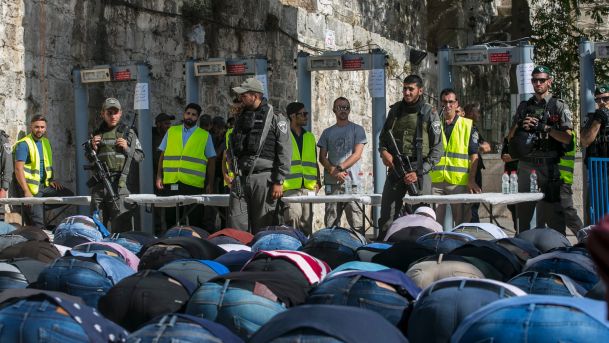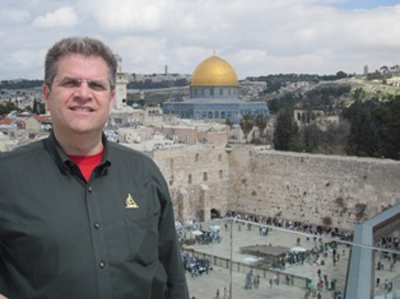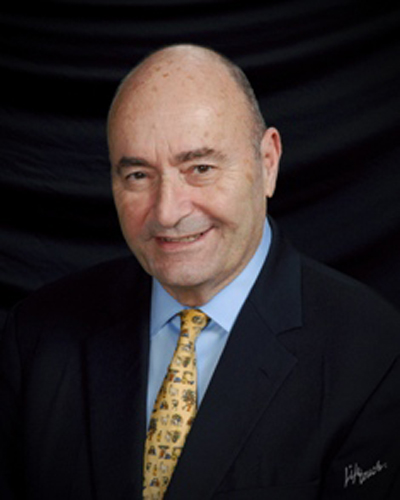The Geo-Politics of the Temple Mount Crisis: an interview with Seth Frantzman
By Mike Bates and Jerry Gordon (September 2017)

Muslims worshipping before metal detectors at Temple Mount July 16, 2017, Source: Ha’aretz
shot and killed two Israeli police officers from the loyal Druze sect, 30-year-old Hail Stawi, from Maghar, and 22-year-old Kamil Shanan, from Hurfeish, both in northern Israel. Officer Shanan was the son of former Israeli Druse Knesset member Shakib Shanan. The perpetrators, who injured two other Israeli police officers, were promptly killed by return fire from other Israeli border police.
Watch the video of the Temple Mount attack on July 14th.
Israeli police did the only rational thing. They closed the Temple Mount and placed metal detectors and surveillance cameras at each gate entrance to the Noble Shrine of the two Mosques atop the platform of what is the revered Jewish holy site of the Second Temple. Then they reopened it. That security measure triggered protests from Muslim worshippers, who refused to pass through. It triggered protests from across the Ummah-the global community of Muslim believers. The administrators and Imams of the Waqf, or trust, appointed by the King of Jordan, Abdullah II, and the Grand Mufti of Jerusalem appointed by the Palestinian Authority falsely claimed that “al Aqsa is in danger,” that is, from Israel.
arrested in July, 2017, and later indicted in mid-August in the Haifa District Court. They were accused of making those Carlos submachine guns, copied from the Swedish Carl Gustave weapon. They planned to cross into Syria to join the Islamic State. Sheik Salah was once again arrested for incitement and is awaiting a trial and sentencing.
The Halamish episode resonated in Washington. Just before Congress recessed on August 4, 2017, the US Senate Foreign Relations Committee passed a version of the eponymous Taylor Force Act named for a West Point Graduate and US Army officer who served in both Iraq and Afghanistan. The US full Senate is likely to pass it upon return in September. The PLO denounced it as an “unacceptable act.” Force was stabbed and killed by a Palestinian terrorist at a restaurant in Tel Aviv in March 2016. The Act is directed at impounding US funds supporting various projects of the Palestinian Authority given the PLO/Fatah funding of a so-called “pay for slay” program. This program pays stipends to jailed terrorists such as al-Abed and their families. He would receive the equivalent of $3,100.00 a month for his murderous act. Estimates suggest that more than half of the foreign aid funds in the PA budget for 2018 of $693 million are allotted for these payments.
The hypocrisy of Muslim objections to Israeli Police taking security precautions is reflected in the significant bio-metric and electronic measures used by Saudi Authorities for the annual Haj of the faithful at the Grand Mosques in Mecca and in Medina to deal with possible terrorist threats. The terrorist takeover of the Grand Mosque in Mecca in 1979 prompted those security measures. Because of global terrorist threats the Vatican and India have taken security measures to protect religious shrines as has the Muslim Ismaili sect in Pakistan.
The persistent calls for removal of the offending Israeli security measures persisted, even being characterized by autocrat Turkish President Erdogan as an offensive “challenge to the Islamic character” of the Noble Shrine. The government of Iran promptly paid for thousands of packaged meals provided to Muslim protesters at the Temple Mount. They came with a flyer quoting Ayatollah Khamenei: “With the help of God, Palestine will be freed. Jerusalem is ours.”
King Abdullah II of Jordan was immediately incensed and arranged for a rare meeting with PA President Mahmoud Abbas in Ramallah. Jordan relinquished claims to the West Bank in 1988. The motivation for Abdullah is to forestall more restiveness in Jordan amid increasing opposition to his alliances with Israel and even the US.
Following the uproar, perhaps prompted by calls for restraint from the Trump Administration in Washington, the Netanyahu government relented and removed both the metal detectors and surveillance cameras. It has been suggested that Israeli security feared another Intifada. During a Channel 2 interview in late July, suggestions were made by Likud MK Avi Dichter, former Shin Bet director and head of the Knesset Foreign Affairs and Defense Committee, to make the Muslim Noble Sanctuary atop the Temple Mount into a “sterile area” through technical means to prevent the two mosques of the so called Noble Sanctuary from ever again being turned into a weapons storage area.
Seth Frantzman, in a Jerusalem Post op-ed on the Temple Mount Crisis, cited the astute comments of Palestinian expert, Jonathan Schanzer of the Washington, DC-based Foundation for the Defense of Democracies. Schanzer noted the Netanyahu stance towards the Palestinian Authority amidst the developing tacit relationship with Arab monarchies and emirates over the common threat of hegemonic Iran. Schanzer said:
Palestinian Authority President Mahmoud Abbas’ decision to cut off ties with Israel “gives him leverage with regard to the so-called regional architecture, where he was being left out.”
This would give him an opportunity to weigh in with the Arab states.
Netanyahu is not willing to cede that leverage and this might explain his unwillingness to bend to the demands of the Palestinians right now.
The UAE, Bahrain and Saudi Arabia are still focused on pressuring Qatar to end what many commentators in Riyadh and Abu Dhabi say is an Iran-Qatar axis of extremism spreading instability throughout the Middle East.
Frantzman Responded:
In short, what is happening so far in Jerusalem is not an existential crisis for those countries with which Israel shares a worldview in the Middle East.
But Netanyahu should know that the main concern of these countries is instability.
The instability to which Frantzman referred was the outcry from King Abdullah of Jordan over the shooting deaths of two Jordanian teenagers who had attacked an Israeli security guard, Ziva Moyal, at the legation in Amman on July 23, 2017. That prompted Netanyahu to invoke the Treaty of Vienna and an evacuation of the entire legation staff headed by Ambassador Einat Schlein and the security officer back to Israel. King Abdullah called out Israeli PM Netanyahu for hugging Moyal, calling it “unacceptable and provocative behavior.” Enmity among Jordanians toward Israel had antedated this episode. In any event, the Israeli security guard was interviewed by Israeli police to determine the facts in the attack.
In the midst of the Temple Crisis, the Trump White House announced it was dispatching the President’s son-in-law Jared Kushner, Special Middle East Envoy Jason Greenblatt, and National Security Council official Dina Habib Powell to Jerusalem and Ramallah for consultations. PA President Mahmoud Abbas described these dispatches of officials a “pointless” exercise. Moreover, Kushner’s remarks caught on audio and published in WIRED magazine at a meeting with Congressional interns discussing his role in calming the Temple Mount crisis suggested that “there may be no solution” to the Palestinian Israeli impasse on the moribund peace process.
In August, another contretemps arose over allegations that Gen H.R. McMaster, National Security Adviser, had fired staffers who were pro-Israel or were so-called “hawks” on overturning the Obama administration’s Iran nuclear deal. A dossier on McMaster’s views on the Israel and Iran contretemps was prepared and promoted by the Zionist Organization of America seeking the firing of the National Security Adviser by President Trump. There is still a dispute as to whether major Trump-backer and friend of Israeli PM Netanyahu, gambling mogul Sheldon Adelson, had backtracked from his initial condemnation of McMaster.
PM Netanyahu was at the center of a number of police investigations questioning alleged corruption that have yet to surface in possible charges. The major turn in those on-going investigations came when a Likud ally American born Ari Harrow apparently became a cooperative witness in the on-going investigations.
Against this background, we reached out to interview Seth Frantzman, opinion editor of The Jerusalem Post and writer of the weekly Terra Cognita column.



Mike Bates, Seth Frantzman and Jerry Gordon
Mike Bates: Good afternoon and welcome to Your Turn. This is Mike Bates. This hour we are doing one of our periodic Middle East round table discussions and I have with me in the studio Jerry Gordon, Senior Editor of the New English Review and its blog, The Iconoclast. Welcome Jerry.
Jerry Gordon: Glad to be back Mike.
Bates: And joining us by telephone for the first time Seth Frantzman, Opinion Editor for the Jerusalem Post and writer of the weekly column, Terra Incognita. Seth Frantzman, welcome to Your Turn.
Seth Frantzman: Great, thanks a lot for having me.
Bates: Seth because this is your first visit with us I was reading your bio so my opening question is somewhat of a personal one, not a political one. How did you go from being an infant in the State of Maine to being the Opinion Editor at the Jerusalem Post in Israel?
Very few people were interested in coming here at the time which is probably a kind of good thing for me, so I happened to come to Jerusalem to study for a master’s degree at the Hebrew University in Jerusalem. They still have an English language program there at the Rothberg International School. So, I came to Israel, and I basically have stayed ever since in Jerusalem and Israel and I spent a lot of time reporting from the region. I have done a lot of reporting from Iraq, Turkey, and Egypt. In many ways, Jerusalem and this conflict are sort of a center, I think, of so much that goes on in the world. I mean, it may not want to be a center, but it happens to be because of the nature of where it is and the world’s religions.
Frantzman: What happened that day which was if you remember back on July 14th which was a Friday, there were three young men who came to Jerusalem. They came from an Arab town, almost a city, inside Israel’s Green Line called Um al Fahm. They came to Jerusalem and with a fourth man whose identity has not been revealed but has been detained. The fourth man brought weapons onto the Temple Mount which is of course the holy site where you have the Dome of the Rock and Al Aqsa Mosque. Obviously, it is the place where the second Jewish Temple existed.
Bates: Right.
Bates: Now, I have an opinion/question—but you are, after all, the Opinion Editor of The Jerusalem Post, so I trust you have no problem giving your opinions. In your opinion, did the Netanyahu government cave when they removed the metal detectors or are the security cameras truly going to be adequate protection?
Frantzman: The King of Jordan’s involvement is interesting because the Kingdom of Jordan had relinquished its claims to the West Bank but it has never relinquished its role as a protector of the holy place. It views itself as closely connected to the Waqf and closely connected to protecting or defending the Temple Mount. The Jordanian relationship with the Temple Mount is both very special and very unique. The Jordanians as you said have another relationship with what goes on in Ramallah and Mahmoud Abbas. If we look back to the beginning of the Trump administration, Trump originally wanted to move the Embassy. One of the first that Trump met with after he was inaugurated was the King of Jordan. I think the King of Jordan has conducted more business to Washington than any other foreign leader in the last six months The King of Jordan thinks that if there is a change in the status quo in Jerusalem, it could turn into an Intifada. That could also lead to some form of repercussions inside the Kingdom. Which could lead to his possible removal. His trip to the West Bank of course was to pay lip service to showing that he is standing by the Palestinians and, of course, the faithful.
Gordon: Seth, there appears to be a power struggle going on between PA President Mahmoud Abbas and Hamas in Gaza. There also is a figure who was thrown out of Gaza in 2006, who has suddenly reappeared on the scene as a power broker. He has been living in exile in the UAE. What is, in fact, going on in those political dynamics and what can we expect?
Frantzman: Obviously, the power broker you referred to is Mahmoud Dahlan, right?
Gordon: Yes, that is correct.
Bates: So, do you see Hamas weakening over this or not?
Gordon: Seth, just before Congress recessed, the Senate Foreign Relations Committee passed the Taylor Force Act. It was named in memory of an American graduate of West Point who served as an officer in both Iraq and Afghanistan. He was killed in a Tel Aviv restaurant, March 8, 2016. The Act may sequester upwards of four hundred million in U.S. aid to the PA because of its so-called “pay for slay” policies in which they were making payments to jailed Palestinian terrorists and their surviving families. That is going to significantly impact on foreign aid for PA. It was roundly objected to by the PA. What is going on there?
Bates: Seth, when you say they have an obligation to pay those families, what do you mean? Is this a legal contractual obligation to pay the families of these so-called martyrs?
Gordon: Seth, you have written a rather stunning series about what you have discovered on the ground both in the Golan and on the Lebanese border. What did you find there that seemed to be menacing towards Israel?
Bates: What is the situation with Iranian involvement and bases in Syria? What kind of threat does that pose to Israel? What is Israel going to do about it, if anything?
Gordon: Seth, the Trump White House is dispatching a team consisting of the President’s son-in-law Jared Kushner, Jason Greenblatt, and a new name, Dina Habib Powell, to check on the pulse of the Middle East peace process between the PA and Israel. What is going on there?
Bates: Well, speaking of the White House, Seth, what is the Israeli view of National Security Advisor General McMaster and his impact on maintaining the U.S. Strategic Alliance with Israel?
Bates: Seth, you just said that all recent administrations were friendly with Israel. Would you include the Obama administration in that? It seemed to me that it was pretty contentious.
Bates: Well, the Obama administration we know interfered with Israeli elections trying to oust Benjamin Netanyahu and then, late in his Presidency, abstained in a UN Security Council resolution proposed by New Zealand and threw Israel “under the bus” through that abstention.
Gordon: What are the views of Israelis about the several police investigations into allegations of corruption and the impact on the continuity of the Likud government of Israeli Prime Minister Netanyahu?
Bates: Seth, it was very easy for me to dismiss the allegations against Bibi Netanyahu in the beginning but then he recently had an aide that turned against him.
Frantzman: Yes.
Listen to the 1330amWEBY interview with Seth Frantzman.
__________________________________
Jerry Gordon is a Senior Vice President of the New English Review.
To help New English Review continue to publish scholarly and interesting articles, please click here.
here.